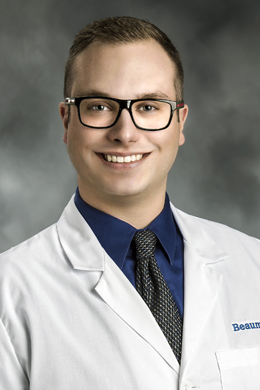Physician Spotlight: Dr. Robert J. McClowry
 Robert J. McClowry, M.D., Family Medicine
Robert J. McClowry, M.D., Family Medicine
Why did you decide to become a physician?
I always knew I wanted to do something that made an impact on the world and in peoples’ lives. I ended up breaking my arm while playing football in high school, which required surgery. While sitting in the hospital as a bored 17-year-old, I looked around and was enamored by all the clinicians around me and the complexity of it all: surgeries, medical teams, medications, teamwork, etc. As such, I thought “Maybe I could do this...” and from there, I began pursuing my path.
Why did you choose your specialty?
I was extremely fortunate in medical school to work with amazing physicians and mentors from all specialties. When exploring different specialties, I tried to focus on what was really important to me as a human being and person. What I recognized was that I thrived on my relationships with patients and developed a passion for working with underserved populations. Family medicine provided the opportunity to provide comprehensive care across the continuum of care to those who were most in need. Additionally, many of my mentors in medical school were in academic leadership, and they were all family medicine physicians. I have a passion for teaching and education, and I think it was natural for me to follow in their examples.
If you weren’t a physician, what career might you have pursued instead?
My passion for education would totally drive me into becoming a teacher. My sister is a teacher, and I relish the opportunity to discuss teaching methodologies or strategies when working with “difficult learners.” She also works with an underserved population, so sharing strategies on “what’s important” and becoming innovative and not just “doing what’s always been done because that’s how it’s been done” has made me recognize that I think I would do okay in that field and still be able to be innovative with topics other than medicine.
What would you say has been your most noteworthy contribution thus far in your career?
Practicing medicine has given me the unique opportunity to work with human beings when they are at some of the most difficult points in their lives. The resilience that human beings have is so fascinating to me and is such a key factor to recognize when trying to actually be effective in providing care. Empowering patients by helping them recognize their own strength has made all the difference in patient care.
Describe your philosophy in practicing medicine.
I am a firm believer that practicing medicine is a partnership between the patient and the clinician. My biggest “pet peeve” is when a patient is labeled as “non-adherent." More often than not in these scenarios, it has never been discussed with the patient why they are having difficulty with their treatment plan. We have to meet people where they are. Unfortunately, exam room sizes have not changed, but the number of entities in the exam room has: the clinician, the patient, the third-party payer, quality metrics, patient experience surveys, shorter appointment times, etc. Navigating today’s health care system is difficult for people who actually work in the system, and nearly impossible for those who do not. Thus, a partnership between clinician and patient is the key to achieving optimum wellness and ultimately empowering patients to recognize that they have a role in their health care.
Can you think of a time in your career you were part of a PFCC win or possibly a PFCC challenge?
Being fortunate to actually have the time to speak with a patient can actually go a long way. While rounding in the hospital, a patient was admitted due continuously overdosing on his medication. The patient’s chart was labeled with “non-adherent,” “non-compliant” and “suicidal.” The patient would get frustrated after discussions with clinicians and leave the hospital against medical advice. After spending literally hours with the patient, I recognized he had no grasp of his health condition, was not suicidal and was just trying to do what he was told to do by other clinicians but felt routinely dismissed. After multiple extended visits during that hospitalization and multiple follow-up appointments in the outpatient setting, we have been able to significantly reduce his hospital admission rate. Human beings are just that: human beings. We practice medicine in vivo and not in vitro.
By the time you retire, what is one thing you hope you will be able to say about your experience?
I simply hope that some of the residents and students, and some colleagues, whom I educate will hear my annoying voice in the back of their head reminding them to look at the whole picture of the patient. Patients are people living with diseases. They are not defined by their disease processes.
Favorite sports team?
My father and two uncles played football at Michigan State University. My cousin was captain of the women’s soccer team for three years at Michigan State. I had no chance except but to bleed green my entire life. GO SPARTANS! GO GREEN! GO WHITE! GO STATE!